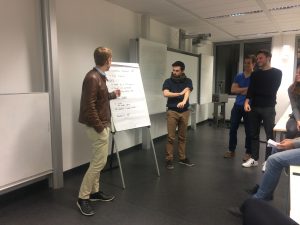Social Entrepreneurship Workshop
By Maximilian Wühr and Konstantin Huneke
Published on 27 Jan 2017

There are non-traditional entrepreneurial ways in order to create added value for society.
CDTM students are sometimes perceived as wanting to attend CDTM to acquire the necessary managerial and technological skills on how to found the next unicorn. But that does not reflect the actual diverse interests of Centerlings. Beyond the traditional entrepreneurial approaches in tackling real world problems, there is another, not so often mentioned route in entrepreneurship: social ventures. Social ventures bridge two worlds: the non-profit world of solving social problems and generating impact by improving people’s life and the traditional, for-profit world of operating a sustainable business model.
A brief introduction to social entrepreneurship and how to finance a social venture.
That is why in the evening of the 19th of December, two Centerlings organized a Social Entrepreneurship workshop for the CDTM community. The participating students got a brief introduction to the business model characteristics of social ventures by the first lecturer Dr. Dominik Domnik, CFO of the Social Entrepreneurship Akademie. After a short break, Mrs. Sabine Kaiser, Senior Transaction Manager at FASE, talked about how the financing methods of social startups differ in relation to traditional startups.
Participants develop key performance indicators on how to measure social impact.
Lastly, the Centerlings had to become active themselves. As part of a case study, their task was to come up with key performance indicators on how a specific social venture generates impact on a societal and environmental level. Additionally, they reviewed the viability of the business plan and the scalability of the business. Referring to Mrs. Sabine Kaiser’s talk, the two student groups also had to evaluate which possible financing methods for the particular case were beneficial. After presenting their results and getting feedback from the two organizers of the workshop, it ended with a well-deserved get-together.



Students are presenting their case results
Social Entrepreneurship is emerging but its real meaning is often misunderstood. The participants’ key learning is in particular reflected by their change of awareness for social entrepreneurship: instead of associating social entrepreneurship only with social clubs, they are now aware of the many entrepreneurial facets it offers. In general, the concept social entrepreneurship is becoming increasingly popular since especially Millennials want to find real meaning in their lives beyond collecting things. If you would like to become active yourself, it is highly recommended to visit eleza.org, a CDTM social venture which aims to educate a new generation of responsible startup founders. Finally, we would like to thank the two lecturers Dr. Dominik Domnik and Sabine Kaiser for giving a glimpse into the relevance of business models and financing in social entrepreneurship. by Maximilian Wühr and Konstantin Huneke